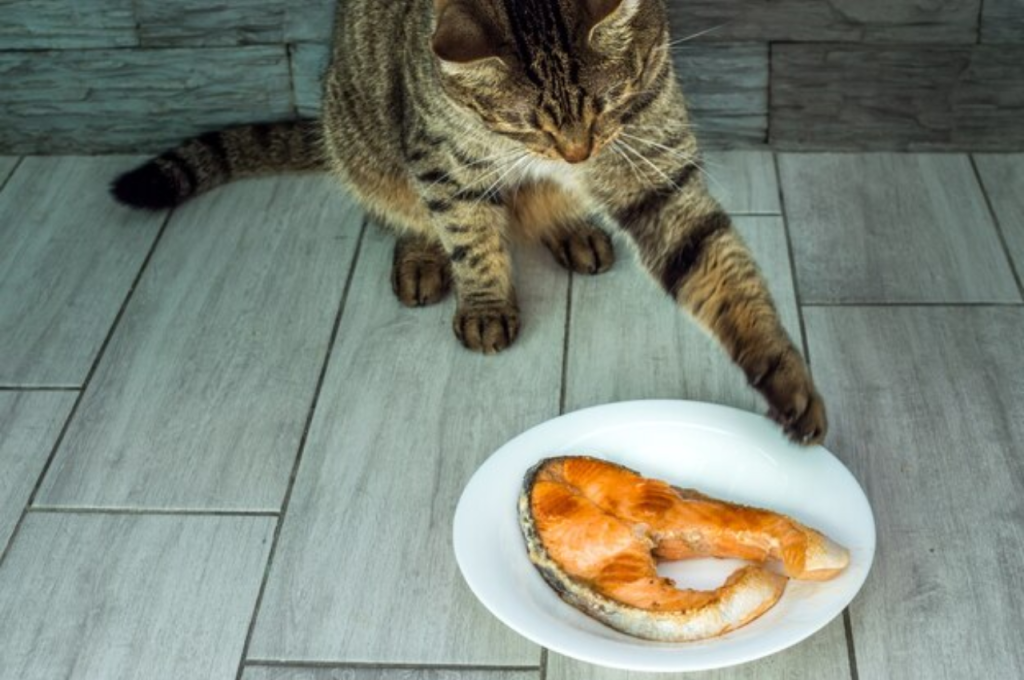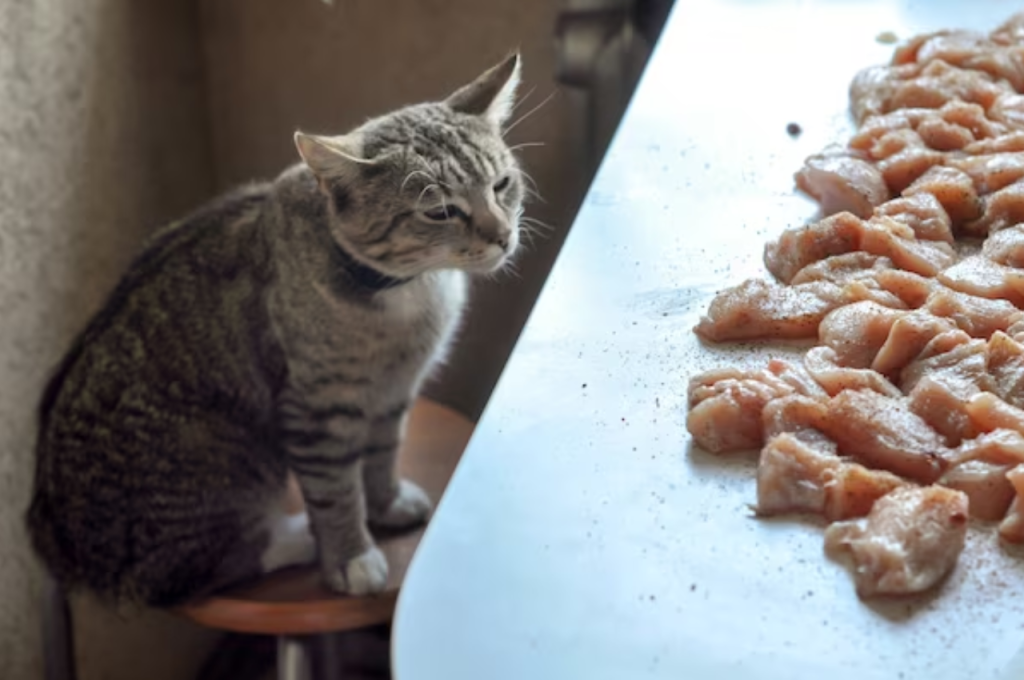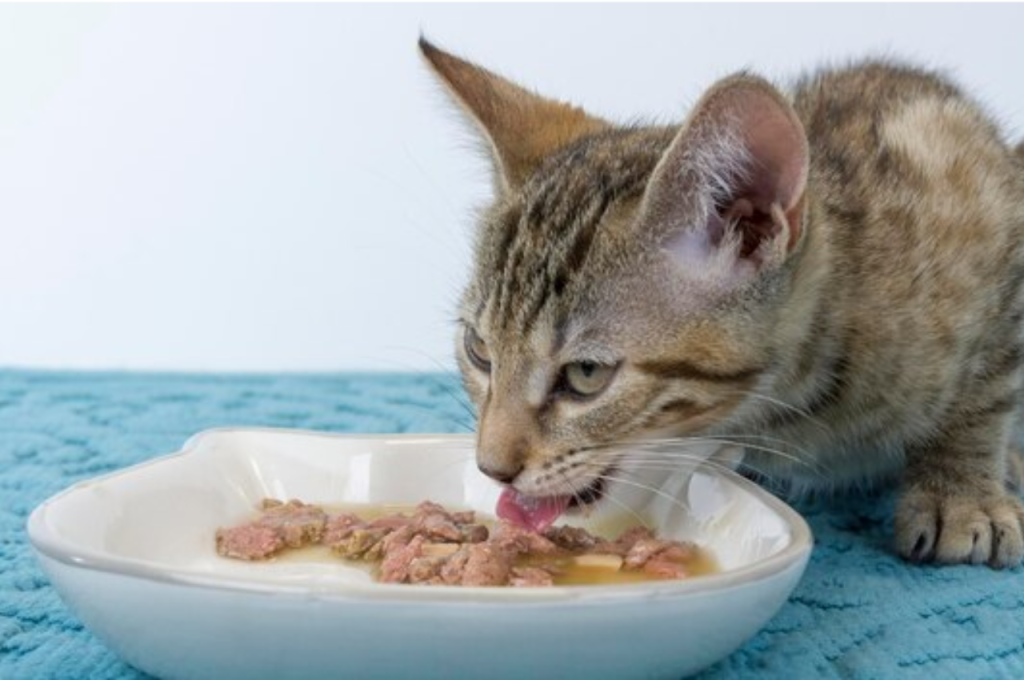Yes, salmon is good for cats as it is a great source of protein and omega-3 fatty acids. Salmon can support your cat’s overall health and promote a shiny coat and healthy skin.
It is important to feed your cat salmon in moderation, as a balanced diet is key to their well-being. Salmon is popular among cat owners looking to incorporate variety into their pet’s diet. However, some cats may have specific dietary needs or preferences, so it’s best to consult your veterinarian before introducing salmon into your cat’s food routine.
In the following sections, we will explore the benefits of salmon for cats, how to safely incorporate it into their diet, and potential risks to be aware of.
Salmon and Cats
Salmon is a popular fish known for its rich flavor and nutritional benefits. When it comes to feline friends, salmon is often a hot topic of discussion. Let’s explore the relationship between salmon and cats, focusing on their nutritional value and the importance of omega-3 fatty acids.

Nutritional Value of Salmon
Salmon is a great source of protein, B vitamins, and essential minerals for cats. It provides nutrients that support their overall health, including strong muscles and a healthy immune system.
Omega-3 Fatty Acids for Cats
Omega-3 fatty acids found in salmon promote healthy skin and a shiny coat in cats. These essential fatty acids also play a crucial role in supporting brain function and reducing inflammation in the body.
Health Benefits
When it comes to the health benefits of salmon for cats, the advantages are numerous. The omega-3 fatty acids and other nutrients in salmon can provide various health benefits for your feline friend. Let’s explore some key health benefits of incorporating salmon into your cat’s diet.
Improved Skin and Coat Health
Salmon is an excellent source of omega-3 fatty acids, particularly EPA and DHA, which are crucial for maintaining your cat’s skin and coat health. These fatty acids help reduce inflammation, alleviating skin conditions like dermatitis and allergies, and promoting a healthy, shiny coat.
Supporting Cognitive Function
The omega-3 fatty acids in salmon can also support your cat’s cognitive function. These essential fatty acids are beneficial for brain health, aiding in maintaining cognitive function and supporting overall brain health.
Concerns and Considerations
When it comes to feeding our feline companions, it’s vital to consider the concerns and considerations surrounding their diet. One popular question among cat owners is whether salmon is good for cats. While salmon can provide several health benefits for cats, there are a few important factors to keep in mind. In this article, we will explore two key concerns—potential allergies in cats and mercury and contaminant risks—when it comes to feeding salmon to our furry friends.
Potential Allergies in Cats
Allergies can affect cats, just like they can affect humans. While salmon is generally considered safe for cats, some felines may experience an allergic reaction to this fish. Common symptoms of an allergic response can include itchiness, redness, swelling, vomiting, and diarrhea. If you notice any of these signs after feeding your cat salmon for the first time, it’s essential to consult with a veterinarian to determine if your cat is indeed having an allergic reaction.
Mercury and Contaminant Risks
Mercury and other contaminants can pose potential risks when it comes to including salmon in your cat’s diet. Salmon inhabit both freshwater and saltwater environments, and environmental contaminants can accumulate in their tissues over time. These contaminants may include mercury, polychlorinated biphenyls (PCBs), and pesticides, which can be harmful to cats when consumed in large amounts.

It’s worth noting that the concentration of contaminants in salmon can vary depending on the source and quality of the fish. Wild-caught salmon tends to have lower levels of contaminants compared to farmed salmon, as wild-caught fish generally have less exposure to potential pollutants. To safeguard your cat’s health, you may want to choose high-quality, responsibly sourced salmon or speak to your veterinarian for advice on safe feeding practices.
Feeding Recommendations
Salmon is a nutritious choice for cats, providing essential omega-3 fatty acids for overall health and shiny coats. In moderation, it can be a tasty addition to a balanced feline diet. However, too much salmon may lead to nutrient imbalances, so it’s important to follow feeding recommendations.
Moderation is Key
Just like with any other food, moderation is key when it comes to feeding salmon to your cat. While salmon can provide several health benefits, it should not make up the entire diet of your feline friend.
Cooked vs. Raw Salmon
When deciding whether to feed your cat cooked or raw salmon, there are a few important factors to consider. While cats are natural carnivores and can digest raw meat, there are potential risks associated with feeding them raw fish. Raw salmon may contain parasites and harmful bacteria that can cause serious health issues for your cat. Cooking the salmon thoroughly helps to eliminate any potential parasites and bacteria, making it safer for your cat to consume. Steaming, baking, or grilling the salmon without any seasoning is the best way to prepare it for your feline companion. Remember to remove all bones and skin before offering it to your cat, as these can pose a choking hazard. It’s important to note that not all seasonings and spices are safe for cats. Garlic, onion, and salt, for example, can be toxic to felines. Therefore, it’s best to keep the salmon plain and simple. Here are some important feeding recommendations to keep in mind when incorporating salmon into your cat’s diet:
- Consult your veterinarian: Before introducing salmon or any new food to your cat’s diet, it’s always a good idea to consult your veterinarian. They can provide valuable insight based on your cat’s specific needs and health condition.
- Quality and sourcing: Always choose high-quality salmon that is fresh and free from any additives or preservatives. Opt for wild-caught salmon if possible, as it generally contains fewer contaminants.
- Portion control: Remember to feed salmon to your cat in moderation. As a general rule, salmon should make up no more than 10% of your cat’s daily calorie intake.
- Diversify the diet: While salmon can offer a great source of protein and omega-3 fatty acids, it’s essential to provide a balanced diet for your cat. Incorporate other protein sources, such as chicken or turkey, and ensure they receive a variety of nutrients.
- Observe any adverse reactions: Keep a close eye on your cat’s reaction to the salmon. If you notice any digestive issues, allergies, or discomfort, discontinue feeding it and consult your vet.
Remember, every cat is unique, and what works for one may not work for another. It’s crucial to monitor your cat’s health, behavior, and overall well-being when introducing any new food into their diet.
Alternatives to Salmon
If your cat has an aversion to salmon or if you prefer to diversify their diet, several alternative options can provide similar nutritional benefits. It’s important to ensure that these alternatives are safe and suitable for your feline friend, so let’s explore some alternatives to salmon for your cat’s diet.
Other Fish Options
Fish can be an excellent source of protein and omega-3 fatty acids for cats. When looking for alternatives to salmon, consider other fish such as:
- Cod
- Tuna
- Trout
- Herring
- Sardines
Commercial Cat Food Choices
Many commercial cat foods offer a wide range of flavors and formulations to suit your cat’s preferences and dietary needs. When seeking alternatives to salmon, you can explore commercial cat food options that contain:

- Chicken
- Duck
- Turkey
- Beef
- Lamb
Conclusion
In considering salmon as a potential cat food choice, it’s important to recognize the benefits and risks involved. While salmon can be a healthy addition to a cat’s diet due to its omega-3 fatty acids, it’s crucial to moderate portions due to potential health concerns, such as mercury exposure.
Overall, balance and moderation are key when it comes to feeding salmon to cats.
